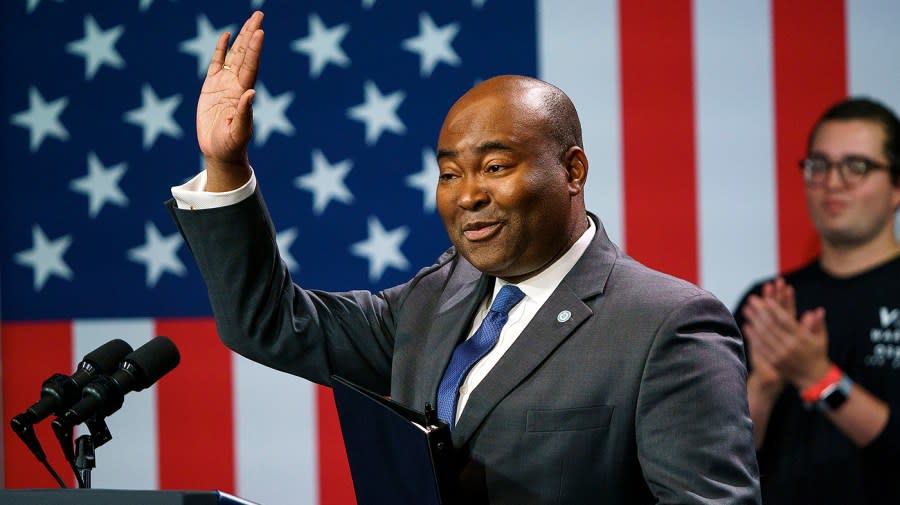Democrats to vote on primary calendar at DNC winter meeting

The Democratic National Committee (DNC) is scheduled to vote Saturday on its Rules and Bylaws Committee’s recommendation to reorder the presidential primary calendar in 2024 amid concerns from some states about both the feasibility and desirability of the changes.
In December, the rules panel approved waivers to five states to hold their presidential primaries before the first Tuesday in March 2024, as long as those states meet requirements the panel specified. The proposal came the day after President Biden sent the panel a letter saying in part that voters of color should come earlier in the nominating process. The letter said early states “must reflect the overall diversity of our party and our nation — economically, geographically, demographically.”
Iowa, which typically holds the first nominating contest in the country, was not included in the rules committee’s list of states considered for the early window. The panel added Michigan and Georgia to the window and shuffled the order of typical early states New Hampshire, South Carolina and Nevada. The proposal puts South Carolina first, New Hampshire and Nevada second on the same day, Georgia third and Michigan fourth.
According to the U.S. Census Bureau, around 85 to 90 percent of Iowa’s and New Hampshire’s populations are white. More than a quarter of South Carolina’s population is Black and more than 60 percent is white.
In 2020’s Democratic nominating contests, Biden finished fourth in Iowa, fifth in New Hampshire and first in South Carolina.
Some have seen Biden’s push to elevate South Carolina in the 2024 election calendar as him rewarding the state for propelling his campaign in 2020 and as a way to chart a path for reelection.
The White House has pushed back on this idea, with press secretary Karine Jean-Pierre saying in December, “It had nothing to do with the primary results. And I can definitively say that.”
The new lineup is expected to pass, with many in the party supporting a primary season that begins with more diverse voters.
“The past few elections have made it abundantly clear that the South is the new Democratic battleground. … The road to the White House runs through the South, and this calendar will ensure that the Democratic nominee is fortified for the general election,” eight members of the DNC’s Southern Caucus leadership team said in a statement first reported by Politico.
The DNC’s vote comes amid questions over whether some states can comply with the requirements set out by the rules committee — and arguments against the changes themselves from some states. States that hold their contests earlier than permitted face penalties.
DNC counsel Graham Wilson noted in December that states holding contests in the early window without the DNC’s permission will lose half their delegates. Any candidate campaigning in a non-complying early state, including by putting their name on its primary ballot, “receives no pledged delegates or delegate votes from that state.” The DNC chair is also “empowered to take any other appropriate steps to enforce these rules,” Wilson said.
On Jan. 25, the rules committee voted to extend the deadline for New Hampshire and Georgia to meet their waiver requirements until June (the original deadline was Jan. 5). In both states, meeting the panel’s conditions would require cooperation from Republican elected officials.
New Hampshire Democrats have defended the state’s first-in-the-nation primary status, which it’s held since 1920. In addition to arguments about retail politics and the state being home to a strong labor community, state Democratic Party Chairman Ray Buckley has said the rules panel’s requirements aren’t feasible.
In a letter to DNC Chairman Jaime Harrison, Buckley argued the panel was placing an undue burden on the state by requiring the Republican governor and state legislative leaders to agree to change the primary date and expand early voting access.
In New Hampshire, the secretary of state sets the presidential primary date, and state law specifies it must be the first primary. Republican Secretary of State David Scanlan recently said, “A national political party can set whatever calendar it likes, but New Hampshire will follow its law,” WMTW reported.
Iowa’s parties set their caucus dates. In December, Iowa Democratic Party Chair Ross Wilburn said, “Small rural states like Iowa must have a voice in our Presidential nominating process.” Wilburn also said state law requires Iowa’s caucuses to be the first nominating contest and that the state party would adhere to that law.
Rita Hart, elected Iowa Democratic Party chair on Saturday, said that “this week is going to be a very important one for all of us. … We want to make sure we’re making practical decisions going forward, but this is certainly not a done deal,” Radio Iowa reported.
In Georgia, the difficulty for Democrats is moving the state into the early window. Secretary of State Brad Raffensperger, a Republican, is by law responsible for setting the date. Based on the Republican National Committee’s rules, the GOP would lose delegates if the primary were held earlier than March 1, and the office has said it plans to hold both contests on the same day.
Deputy Secretary of State Jordan Fuchs said, “This needs to be equitable so that no one loses a single delegate and needs to take place on the same day to save taxpayer funds,” according to The Atlanta Journal-Constitution.
Several Democrats in the state are supportive of an earlier primary, the Journal-Constitution reported.
For the latest news, weather, sports, and streaming video, head to The Hill.
